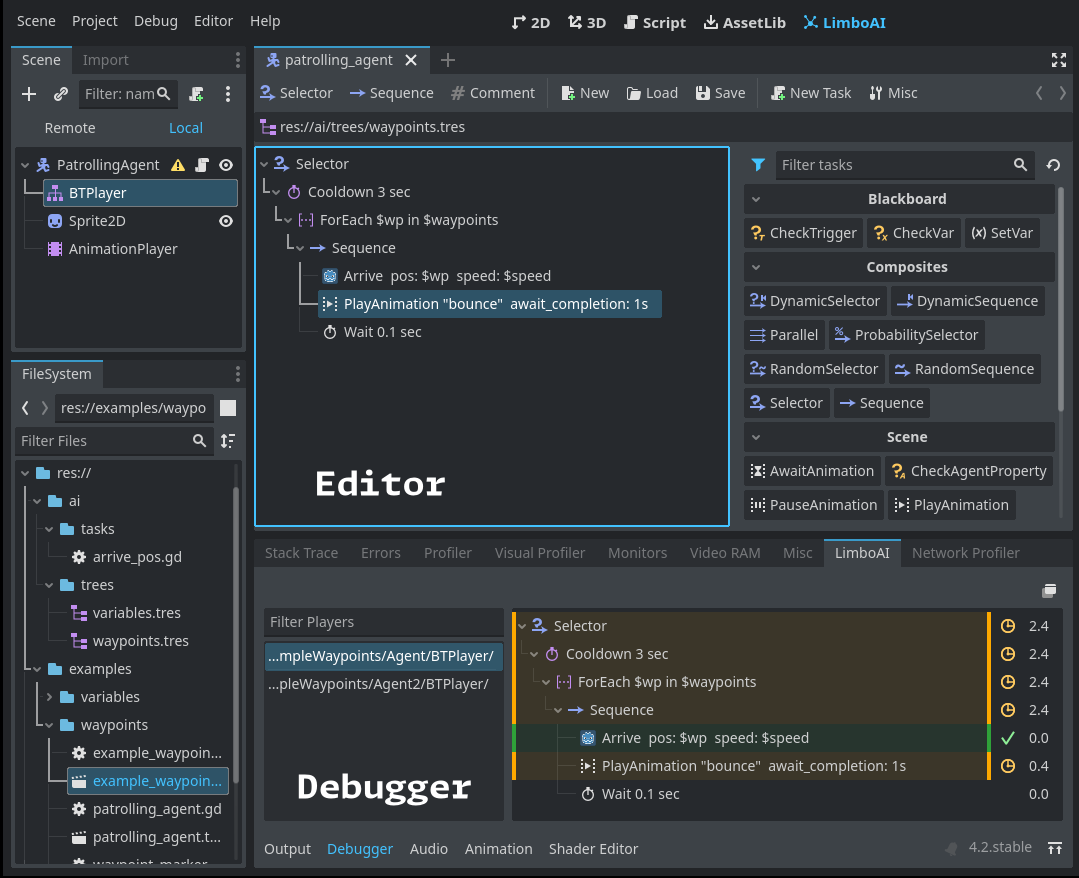|
|
||
|---|---|---|
| .github | ||
| blackboard | ||
| bt | ||
| demo | ||
| doc | ||
| doc_classes | ||
| editor | ||
| gdextension | ||
| hsm | ||
| icons | ||
| tests | ||
| util | ||
| .clang-format | ||
| .gitignore | ||
| LICENSE.md | ||
| LOGO_LICENSE.md | ||
| README.md | ||
| SCsub | ||
| config.py | ||
| register_types.cpp | ||
| register_types.h | ||
README.md

LimboAI - Behavior Trees & State Machines for Godot 4
LimboAI is an open-source C++ plugin for Godot Engine 4 providing a combination of Behavior Trees and State Machines, which can be used together to create complex AI behaviors. It comes with a behavior tree editor, built-in documentation, visual debugger, extensive demo project with a tutorial, and more! While it is implemented in C++, it fully supports GDScript for creating your own tasks and states.
🛈 Supported Godot Engine: 4.2
Behavior Trees are powerful hierarchical structures used to model and control the behavior of agents in a game (e.g., characters, enemies). They are designed to make it easier to create rich and highly modular behaviors for your games. To learn more about behavior trees, check out Introduction to Behavior Trees and our demo project, which includes a tutorial.
Demonstration
🛈 Demo project lives in the
demofolder and is available separately in Releases. It includes a tutorial providing an introduction to behavior trees with examples.
Features
-
Behavior Trees (BT):
- Easily create, edit, and save
BehaviorTreeresources in the editor. - Execute
BehaviorTreeresources using theBTPlayernode. - Create complex behaviors by combining and nesting tasks in a hierarchy.
- Control execution flow using composite, decorator, and condition tasks.
- Create custom tasks by extending core classes:
BTAction,BTCondition,BTDecorator, andBTComposite. - Built-in class documentation.
- Blackboard: Share data seamlessly between tasks using the
Blackboard.- Blackboard plans: Define variables in the BehaviorTree resource and override their values in the BTPlayer node.
- Blackboard scopes: Prevent name conflicts and enable advanced techniques like sharing data between several agents.
- Blackboard parameters: Export a BB parameter, for which user can provide a value or bind it to a blackboard variable (can be used in custom tasks).
- Editor support: Blackboard plan editor, and inspector property editor for exported string properties ending with "_var".
- Use the
BTSubtreetask to execute a tree from a different resource file, promoting organization and reusability. - Visual Debugger: Inspect the execution of any BT in a running scene to identify and troubleshoot issues.
- Visualize BT in-game using
BehaviorTreeViewnode (for custom in-game tools). - Monitor tree performance with custom performance monitors.
- Easily create, edit, and save
-
Hierarchical State Machines (HSM):
- Extend the
LimboStateclass to implement state logic. - The
LimboHSMnode serves as a state machine that managesLimboStateinstances and transitions. LimboHSMis a state itself and can be nested within otherLimboHSMinstances.- Event-based: Transitions are associated with events and are triggered by the state machine when the relevant event is dispatched, allowing for better decoupling of transitions from state logic.
- Combine state machines with behavior trees using
BTStatefor advanced reactive AI. - Delegation Option: Using the vanilla
LimboState, delegate the implementation to your callback functions, making it perfect for rapid prototyping and game jams. - 🛈 Note: State machine setup and initialization require code; there is no GUI editor.
- Extend the
-
Tested: Behavior tree tasks and HSM are covered by unit tests.
-
GDExtension: LimboAI can be used as extension. Custom engine builds are not necessary.
-
Demo + Tutorial: Check out our extensive demo project, which includes a tutorial providing an introduction to behavior trees with examples.
Getting LimboAI
LimboAI can be used as either a C++ module or as a GDExtension shared library. GDExtension version is more convenient to use but somewhat limited in features. Whichever you choose to use, your project will stay compatible with both and you can switch from one to the other any time. See Using GDExtension.
Precompiled builds
- For the most recent builds, navigate to Actions → All Builds, select a build from the list, and scroll down until you find the Artifacts section.
- For release builds, check Releases.
Compiling from source
🛈 For GDExtension: Refer to comments in setup_gdextension.sh file.
- Download the Godot Engine source code and put this module source into the
modules/limboaidirectory. - Consult the Godot Engine documentation for instructions on how to build from source code.
- If you plan to export a game utilizing the LimboAI module, you'll also need to build export templates.
- To execute unit tests, compile the engine with
tests=yesand run it with--test --tc="*[LimboAI]*".
Using the plugin
- Online Documentation
- Introduction to Behavior Trees
- Creating custom tasks in GDScript
- Sharing data using Blackboard
- Accessing nodes in the scene tree
- State machines
- Using GDExtension
- Using LimboAI with C#
- Class reference
Contributing
All contributions are welcome! Feel free to open issues with bug reports and feature requests, and submit PRs.
Got an idea for a behavior tree task that you think would be useful on a variety of projects? I invite you to open an issue and describe your concept.
Social
We have a fresh new Discord server: https://discord.gg/N5MGC95GpP
I write about LimboAI development on the Mastodon: https://mastodon.gamedev.place/@limbo.
Roadmap
Features and improvements that may be implemented in the future:
Providing precompiled builds for download.🗸Tests and CI.🗸GDExtension support.🗸Extensive demo project.🗸- Expanding the library of commonly useful tasks.
- Exploring the execution history of behavior trees in the visual debugger.
- Per-project ignore list for tasks that users may want to hide in the task palette.
- GUI editor for state machines.
License
Use of this source code is governed by an MIT-style license that can be found in the LICENSE file or at https://opensource.org/licenses/MIT.





